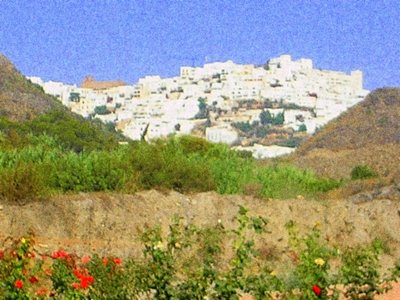The PSOE has long worried about the ‘foreign vote’ in local elections. In 1994, the government of Felipe Gonzalez had proposed that those Europeans living in Spain and listed on the
padrón (the town hall registry) should be able to vote in local elections. The paperwork was prepared for the June 1995 elections but an ambitious junior minister, Alfredo Pérez Rubalcaba, put the blockers on it at the last moment with the very real worry that the foreigners would probably vote conservative…
In the end, the Europeans were allowed to vote for the European elections (where they of course made no impact), but not the local ones…
By 1999, with a PP government in power and new European rules on
émigrés, we were able to – finally – vote in local elections. I was 45 and at last had the vote. I had never been able to vote – beyond the thrilling 1995 European election – in any meaningful way either in England – where I’m from, or Spain, where I’ve lived and actually held residence since 1969.
I could not only vote, I could appear on a list and ask to be voted for. The Spanish
inter alia changed their constitution to allow for this for the first time since it was written in 1978. The Europeans, over eighteen, registered on some
padrón and who had signed a note asking to vote were able to involve themselves in politics. Added to this, the Norwegians (not a EU state) were able to vote – although not run for office.
Although the ‘European’ vote was never going to make much difference – we live in small coastal
pueblos rather than politically powerful cities – the outcome was rather disappointing. A relatively small number of Europeans turned up to the polling booths (some to be turned away for various obscure reasons) and some thirty coastal
pueblos – occasionally fielding foreigners safely far down their lists – were in some small measure affected by the European vote. In Mojácar, an independent party, Mojácar 2000, was able with foreign support to wrest control of the
ayuntamiento. Its councillors were Spanish.
In Jávea (Alicante), a foreigner became a councillor. There was little else to report.
In 2003’s local elections, the foreigners managed a little better, with some 550 voting from the possible 1,950 enfranchised Europeans in Mojácar. No councillors though. In Jávea, the councillors grew to three and they have now formed their own political party for next May’s local elections (
Nueva Jávea at
www.nuevajavea.com ).
The proposed European Constitution that was thumping about last year, supported by the Spanish but roundly thrashed by the French (and promptly dropped from the ‘to do’ pile of Tony Blair and others), is unkind to Europeans who live in other countries than their own. We
can not vote in regional or national elections or – of course – in referenda. We are powerless in
Pan-European elections because of our spread. These evident reasons would make us ‘second class European citizens’.
So in Spain, the European vote has slowly grown. Returning to Mojácar, citizens’ meetings, bad politics (still no foreigners or even English-speakers working in the town hall) and better awareness have all started to bring the European residents out of their self-imposed isolation. Mojácar now has as many European as local voters. The field begins to look interesting…
Enter, stage left, our old friend Rubalcaba, now the Minister for the Interior.
All foreigners should be able to vote in local elections, says the socialist, as it’s only fair.
Well,
yerss, but the socialist interest is in
votes rather than
rights. The large number of immigrants that have flowed into Spain from the Third World and have received indulgences or amnesties from the government, together with work and residence permits, will hardly be voting for the conservative Partido Popular.
Let’s look at some numbers (
El País 23 August 2006).
Europeans in 2003 (i.e. ‘
registered’, being politically expedient but not true numbers): 360,000. In 2007, this should increase to 620,000. By 2007 there should be 165,000 Brits. From the non-EU bit of Europe, and joining the Union in December 2006, there should be 190,000 Rumanians and 60,000 Bulgarians (the Spanish authorities actually estimate the real figure for these two nationalities at 480,000). From
certain South American states, add another 350,000 (Spain is fond of South America. Rubalcaba said in a recent speech that he wants to cement the Ibero-American brotherhood. I don’t think they’ll be voting conservative either). The addition of the rest of South America (Ecuatorians in particular), Moroccans, Chinese, Sub-Saharans, Russians and my wife, a (non-voting) American passport holder, were too much for the
El País to consider, but there are, in fact, some four million foreigners living in Spain at the moment. Theoretically, perhaps three million would qualify: most being supportive of the PSOE
from whence the manna floweth.These wonderful ideas are not acceptable to Brussels as yet, but the PSOE has firm intentions for next year and the PP is currently on its back foot.


